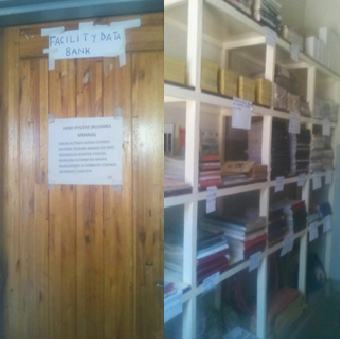By Kassim Kwalamasa
In Malawi the REACHOUT project works in two districts within the central region - Mchinji and Salima - to promote the work of Health Surveillance Assistants (HSAs), a close-to-community (CTC) cadre employed by the Ministry of Health.
REACHOUT has implemented two quality improvement cycles. In the first, REACHOUT Malawi worked on improving the supervision of HSAs. New challenges were identified which included poor quality of services and data, which are addressed in the second cycle which focuses on quality improvement and management.
The REACHOUT Malawi team trained health workers in Salima in quality improvement processes. With facilitation from REACHOUT, health workers from the districts formed a multidisciplinary quality improvement team, consisting of representatives from the clinical, nursing, environmental health, management and administration departments (including the health management information system and district health management team); and representatives from three health centers (Khombedza, Lifuwu and Baptist) that were pilot sites for the quality improvement initiative. Data quality improvement was the priority problem identified. The quality improvement team agreed to focus on this after discussing a range of problems including poor data storage; lack of data analysis culture to support decision making; multiple and duplicative data collection tools; and limited data collation and reporting.
The problem identification process was done in a participatory manner and involved all members of the team who developed a problem tree which helped them identify the root causes of poor quality data and the effects of poor quality data. To improve data collection the team started by developing one integrated data quality assessment tool to replace the multiple forms that were being filled out but rarely collated. The tool focuses on all heath programmes at the health centre level including maternity services, HIV Testing and Counselling, family planning (FP), Out-patient department (OPD), sexually transmitted infections (STI), Antenatal care (ANC), Anti-retroviral Treatment (ART), postnatal services, and the Expanded Program on Immunization (EPI).
The tool is comprehensive and includes a focus on registers, reports, data collectors, data supervision, presence of guidelines or protocols to measure data consistency and reliability, presence of tables, graphs and charts that would indicate data is analyzed and the results used for decision making, and presence of meeting minutes with data quality on the agenda.
The tool was then piloted and the QI team presented the results to the District Health Management Team (DHMT) for guidance and approval. The DHMT approved the tool and allowed the QI members to use it in assessing the facilities. Several data quality supervisions have so far been conducted at the three pilot facilities and results show improvement in some areas.
At the district level the success story of the QI team initiative has been the acceptance and adoption of the data quality initiative by the District Health Management Team and including it in the district implementation plan. This means QI activities will be funded from district funds and hopefully be sustained.
At the facility level there are also successes:
- Establishment of safe data storage rooms that are lockable so that all data can be stored with easy access to those who need it and to minimize data loss. All the three participating facilities have such rooms now
- Data reporting has improved for these facilities and they are now able to report in a timely fashion
Locally led multidisciplinary QI initiatives can contribute to the improvement of community data quality at facility level. A key lesson is that where the team is allowed to identify their own priority problems and find their own ways of solving them, there is greater success and impact. The approach also ensures sustainability of the initiative unlike when problems are identified elsewhere and solutions imposed on locals by those outside the system.

The newly established data storage room at Khombedza - one of the facilities in the intervention led by the Salima quality improvement team.
Recent news
- Towards a Community Health Worker Gender Action Framework, 9 November 2017
- Ava’s story: How do gender norms effect close-to-community provider retention in Bangladesh?, 8 November 2017
- Ensuring data quality? Let’s walk in the shoes of Community Health Workers in Kenya and Malawi, 27 September 2017

This project is funded by the European Union.
